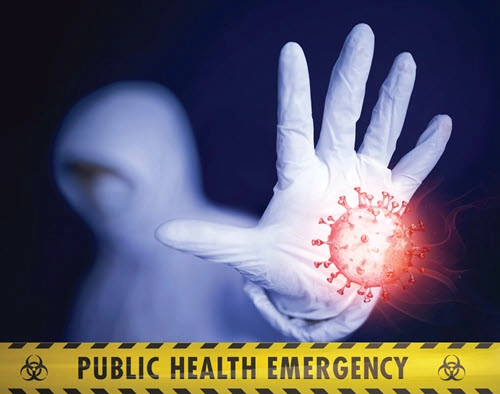MDS Alert
Stay Abreast on Important Agency and Industry News
You may now have a code for residents with a history of COVID-19. Stay ahead of the curve by knowing which updates may affect your facility’s day-to-day reality, from changes in ICD-10 codes to a bill that, if passed, may require facilities to tackle yet another form of documentation. Keep reading to find out another way you need to remain compliant. PHE Continues Xavier Becerra, Secretary of Health and Human Services, has extended the public health emergency (PHE), from July 20, 2021, through Oct. 18, 2021. Facilities can continue using the 3-day waiver — and there’s a bill in the House of Representatives to eliminate the 3-day qualifying stay entirely and thus make the current waiver permanent. Watch Out for ICD-10 Updates The World Health Organization (WHO) has released its latest list of ICD-10 codes. The new codes will go into effect Oct. 1, 2021, and be accurate at least until Oct. 1, 2022. According to the WHO, the new code book will have: Some highlights include new codes to describe various specific health conditions related to COVID-19 diagnoses, including personal history of COVID-19 and COVID-19 infection that progresses to sepsis. There is also new guidance on documenting and coding social determinants of health (SDOH). The new aspects of SDOH coding are bolded here: “Codes describing social determinants of health (SDOH) should be assigned when this information is documented. For social determinants of health, such as information found in categories Z55-Z65, Persons with potential health hazards related to socioeconomic and psychosocial circumstances, code assignment may be based on medical record documentation from clinicians involved in the care of the patient who are not the patient’s provider since this information represents social information, rather than medical diagnoses. For example, coding professionals may utilize documentation of social information from social workers, community health workers, case managers, or nurses, if their documentation is included in the official medical record.” You can find more information here https://ftp.cdc.gov/pub/Health_Statistics/NCHS/Publications/ICD10CM/2022/10cmguidelines-FY2022-7-2022-7-15-21-update-508.pdf. Keep an Eye on This House Bill for Essential Caregivers Several U.S. House representatives are pushing a new bill, The Essential Caregivers Act, that would guarantee each resident in a nursing home two “essential” caregivers. During the public health emergency (PHE), facilities largely limited or eliminated entirely the ability for residents to visit with their loved ones, due to concerns about transmission of SARS-CoV-2, the virus that causes COVID-19. If the bill becomes law, residents will be guaranteed two essential caregivers, who will have the right to visit for up to 12 hours, even during a PHE, as long as they follow all of the same transmission-prevention protocols that staff follow. If their loved one is near the end of life, the hours are unlimited in scope. The bill states that if an essential caregiver is denied access, the facility would have to provide written justification of the denial within 24 hours; the bill, if successful, would create a process for the Centers for Medicare & Medicaid Services (CMS) and the Department of Health and Human Services (HHS) to receive and address complaints, as well. “This means that nursing homes would need to designate staff to monitor for compliance, as well as implement a system for documenting issues that are identified, as well as ensure timely completion of a written notification for noncompliance, should it arise. One more thing to add to the documentation list!” says Linda Elizaitis, RN, RAC-CT, BS, president and founder of CMS Compliance Group in Melville, New York. You can read more about the essential caregiver movement here https://essentialcaregivermovement.org/about-3733. Note These Charges Against NH Staff Attorneys general (AG) in three states have recently announced indictments for former nursing home staff members who are charged with committing crimes against nursing home residents. 1. In South Carolina, the AG announced the grand jury indictment of two women who were staff members at a residential care facility. The women allegedly stole prescription medicine. “Specifically, the defendants are alleged to have unlawfully possessed controlled substances that were prescribed for the vulnerable adults residing at the facility. Additionally, [one woman] is alleged to have trafficked controlled substances, neglected vulnerable adults by failing to provide supervision or medical care, and for practicing nursing for a period of time without authorization.” The South Carolina Attorney General’s Office Medicaid Fraud Control Unit, Fountain Inn Police Department, and the South Carolina Department of Health and Environmental Control were all involved in the investigation. Read more www.scag.gov/archives/43280#ixzz715rfUcnr. 2. Also in South Carolina, a former nursing home staff member was arrested for exposing himself to a resident, as well as attempting to sexually assault a resident, in February 2021 while working at the nursing home. Find out more here www.scag.gov/archives/43279 3. In Alabama, a woman was recently arrested after allegedly stealing $9 million from a resident at an assisted living facility — $8 million in currency and approximately $1 million in real estate. Two other women were arrested after allegedly receiving stolen property. Find out more here www.alabamaag.gov/newsviewer/7e750560-b9f7-4769-ae01-d72079a5a492.


MDS Alert
- COVID-19:
Don’t Miss New Guidance on PRF Money, Reporting
You may be able to use projected 2020 revenues to calculate COVID-19 losses. Nursing homes [...] - News You Can Use:
Stay Abreast on Important Agency and Industry News
You may now have a code for residents with a history of COVID-19. Stay ahead [...] - Best Practices:
Keep Working to Get Drug Use Under Control
CMS is realizing that facility self-reporting may not be the best option for monitoring data. [...] - Reader Questions:
Draw Line for Residents Between ‘Busy’ and ‘Work’
Question: One of our residents with dementia genuinely wants to help, and giving her a [...] - Reader Questions:
Don’t Count This Respiratory Treatment as Therapy
Question: One of our residents uses a nebulizer on her own. Does this count toward [...] - Reader Questions:
Don’t Skill When Hospice is More Appropriate
Question: One of our residents just had a qualifying 3-day stay in a hospital and [...] - Reader Questions:
Differentiate Between Scabs and Eschars
Question: How do I know the difference between a scab and an eschar when I’m [...]

